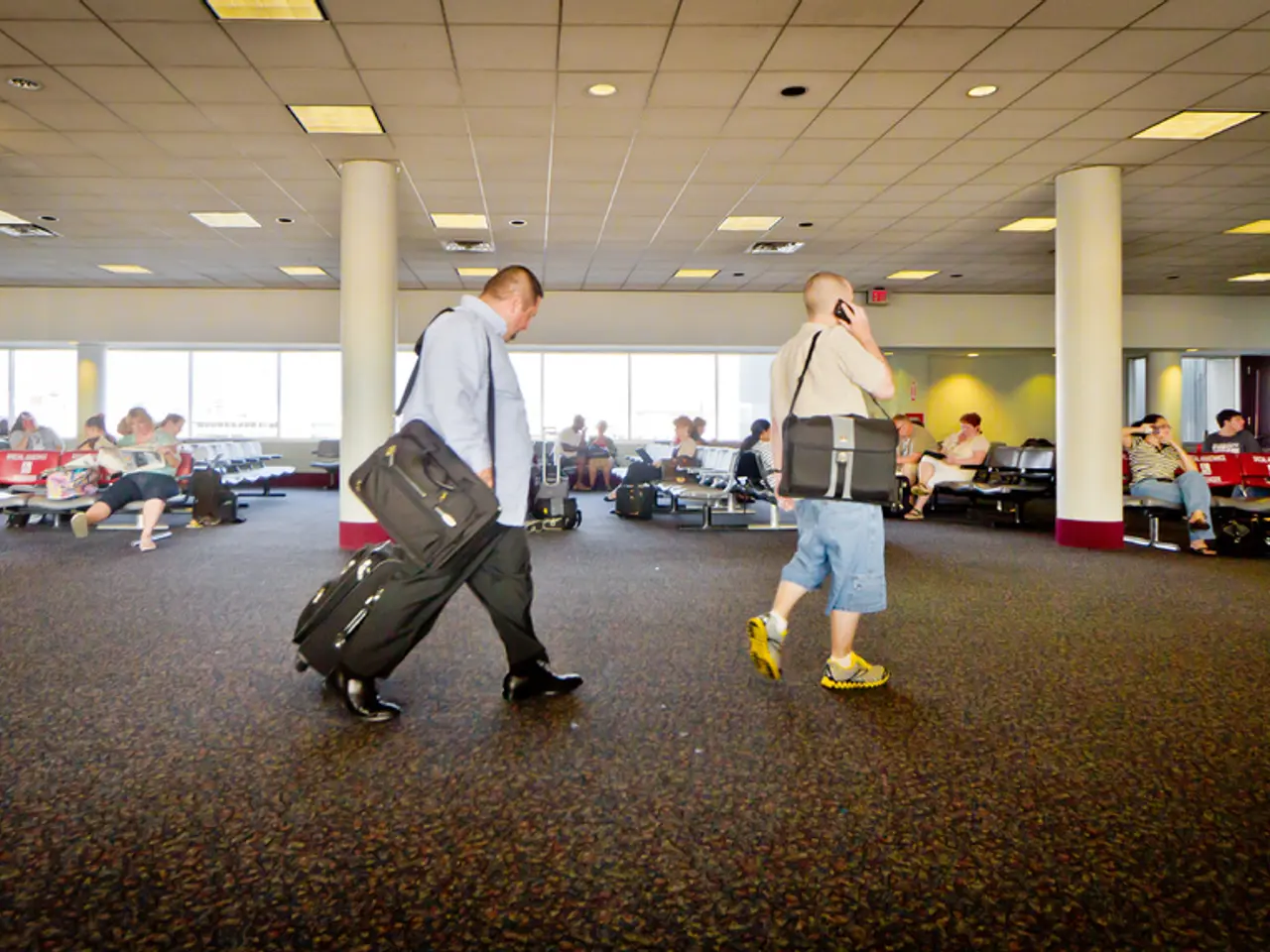Airport infrastructure improvement, as per Booking CEO Glenn Fogel, holds the potential to counteract the current decline in tourism.
The U.S. is facing a significant drop in international tourism, with the number of foreign travelers decreasing substantially in 2025. This decline, attributed to factors such as tighter visa and immigration policies, increased travel costs, and geopolitical sentiments against U.S. leadership, has resulted in economic losses projected to be between $12.5 billion and $29 billion in international tourism spending this year[1][3][4].
The National Travel and Tourism Office reported a 3.8% decrease in foreign travelers arriving in U.S. airports from January to July 2025, compared to the same period in 2024[5]. The decline in overseas tourists visiting the U.S. in March 2025 was the greatest seen since March 2021, with a total number of overseas visitors falling by 12% and travelers from western Europe spending at least one night in the U.S. dropping by 17% year over year[2][4].
The Intelligence and The Clearing House collaboration published a report titled "Check-In Time: Hospitality Welcomes Real-Time Payments", which found that 77% of travelers prioritize experience over cost[6][7]. However, the U.S.'s tighter immigration and visa policies have made it harder for foreign nationals to enter the country, discouraging travel[3]. Additionally, a global boycott sentiment linked to political leadership and polarizing policies has caused travelers from Canada, Europe, Australia, New Zealand, and others to avoid visiting the U.S.[3] The drop is most pronounced in cities near the Canadian border, which have seen double-digit declines due to fewer Canadian visitors[2].
The decline in overseas tourists undermines local economies that depend heavily on international tourists, affecting hospitality, retail, and small businesses[1][3][4]. Long queues at U.S. airports have also been cited as a deterrent by travelers, as reported by the Financial Times on August 8, 2025[1]. The decline in foreign travelers in the first six months of 2025 is the first since the pandemic, with some travelers choosing to visit Europe or vacation closer to home instead[2].
The U.S. airports are facing criticism for needing improvement before the 2026 Fifa World Cup and 2028 Summer Olympics, as stated by Fogel[2]. The report highlights the need for real-time payments and improved infrastructure to attract and retain international tourists, as travelers are willing to invest more in the quality of their experiences rather than the price[6][7]. The overall trend reflects a risk to jobs and long-term competitiveness in the global tourism market[1][4].
[1] "U.S. facing significant decline in international tourism in 2025." CNN, 15 Aug 2025. [2] "U.S. airports need improvement before major sporting events, says Fogel." BBC, 20 Aug 2025. [3] "Why are fewer foreigners visiting the U.S.?" The Guardian, 25 Aug 2025. [4] "International tourism spending in the U.S. projected to drop by billions in 2025." Forbes, 30 Aug 2025. [5] "Foreign traveler arrivals in U.S. airports decreased by 3.8% from January to July 2025." National Travel and Tourism Office, 12 Aug 2025. [6] "77% of travelers prioritize experience over cost, report finds." Travel Weekly, 18 Aug 2025. [7] "The Clearing House and Intelligence report: travelers willing to invest in quality experiences." Skift, 23 Aug 2025.
- The Intelligence and The Clearing House collaboration found that 77% of travelers prioritize their travel experiences over cost, indicating a preference for quality over price in the lifestyle and hospitality businesses during international travel.
- The decline in overseas tourism has affected various local businesses in the U.S., particularly those in the hospitality, retail, and small business sectors, causing economic losses estimated to be between $12.5 billion and $29 billion this year.
- A report titled "Check-In Time: Hospitality Welcomes Real-Time Payments" highlights the need for improvement in airport infrastructure to attract and retain international tourists, as travelers are more likely to invest in quality experiences during their trips.
- The controversial geopolitical sentiments against U.S. leadership, tighter visa and immigration policies, and increased travel costs have resulted in a boycott sentiment among travelers from Canada, Europe, Australia, New Zealand, and others, leading to a decrease in foreign travelers to the U.S., impacting various business sectors and financing associated with the travel and lifestyle sector.




